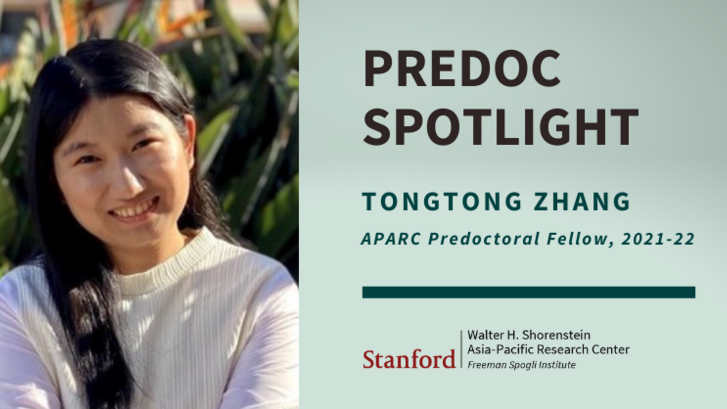Research Assistant Spotlight: Jerome He Examines Great Power Competition with Oriana Skylar Mastro
Research Assistant Spotlight: Jerome He Examines Great Power Competition with Oriana Skylar Mastro
Political Science major Jerome He ‘24, spent the summer assisting APARC Center Fellow Oriana Skylar Mastro. He leveraged the opportunity to expand his knowledge of Chinese security issues and refine his research acumen. We spoke with He about his experience as a research assistant and his time working for Dr. Mastro.

Each summer, Stanford students assist APARC faculty on a variety of projects as research assistants (RAs). In the case of Jerome He ‘24, working with Center Fellow Oriana Skylar Mastro provided an occasion to learn about the nuanced details of China’s foreign policy, as well as cultivate an interest in related topics such as deterrence, cybersecurity, and soft power competition.
He, a Political Science major who intends to pursue a legal career, describes the opportunity to work closely with Stanford faculty as priceless. His collaboration with Dr. Mastro on her research enhanced his own research abilities, especially when interrogating numerous source texts and streamlining arguments into concise memos.
In the following Q&A, He discusses his research assistant experience this summer. The interview was slightly edited for length and clarity.
Sign up for APARC newsletters to receive research and commentary updates from our scholars
Tell us a bit about yourself and your academic interests and extracurriculars.
I am an international student from China, embarking on my third year at Stanford. I love studying political theories and I am a huge soccer fan and a fervent reader of German philosophy. I pay close attention to China’s domestic governance and international politics.
Why did you choose to work with Dr. Mastro?
In the past winter quarter, I talked to Vivian Zhu 23’ about her work with Dr. Mastro. From Vivian, I caught a glimpse of her work experience — challenging, engaging, and knowledge-intensive. I loved the fact that much of the work is task-oriented and is categorized by various topics. On top of that, I had immense respect for Dr. Mastro when I took PoliSci 114S last winter. Working with Dr. Mastro seemed a perfect opportunity to enrich my research experience.
Can you describe the research you are working on?
Dr. Mastro is writing a book on China’s foreign policy. The general idea is to explain how and why China competed differently from the United States in the international arena. RAs who understand Chinese are mainly responsible for going through Chinese sources and extracting valuable information related to a set of different topics. Sometimes we compile memos on a specific topic (such as China’s aircraft carrier development) and carry out literature reviews.
How would you describe this research to someone unfamiliar with international security and geopolitics?
I think the starting point is to realize that countries do not “intuitively” make decisions on how to compete and how to establish security. Foreign policies are shaped by both voluntary decisions driven by sophisticated calculations and arbitrary factors that are beyond anyone’s control. Over the course of time, we witness an array of different competing strategies that define the current international landscape. Chinese citizens could find the idea of military alliances and delivering large troops to foreign lands absurd while American people might feel weird to see China using infrastructure and militias for its military struggle in the South China Sea. Part of our research is to explain the differences, summarize the patterns, and hopefully, shed light on the future development of great power competition in all domains.
What did you learn over the course of your research assistantship and how do you think it will help you in your career?
Working on Dr. Mastro’s team enhances my ability to collect sources, extract information from an enormous number of texts, and streamline my arguments in a concise memo. I was also able to capture an understanding of how top scholars manage to complete complicated academic projects. Working on China’s foreign policy and military strategies opens up a world of fascinating topics like deterrence, cybersecurity, and soft power competition that paints a clearer picture of future courses I will take and future plans I can make.
What's next for you?
I will continue to work with Dr. Mastro in the coming fall and plan to contribute more to her team. I am interested in a legal career, so I aim to shift to some more law-related work after my experience in political science.
Any advice for Stanford students considering a summer RA position?
An opportunity to work with Stanford professors is priceless. With respect to finding the most suitable RA position, it always helps to talk to students who previously worked on the team or professors who are familiar with their colleagues. These conversations can give you a vivid understanding beyond the job description and lead to better CVs.



